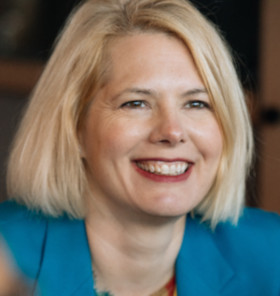artificial intelligence, ethics and society 20200208
closing keynote by gina neff
Gina Neff (Oxford Internet Institute, University of Oxford.)https://www.aies-conference.com/2020/invited-talks/#talk3

Recent advances in artificial intelligence applications have sparked scholarly and public attention to the challenges of the ethical design of technologies. These conversations about ethics have been targeted largely at technology designers and concerned with helping to inform building better and fairer AI tools and technologies. This approach, however, addresses only a small part of the problem of responsible use and will not be adequate for describing or redressing the problems that will arise as more types of AI technologies are more widely used.
Many of the tools being developed today have potentially enormous and historic impacts on how people work, how society organises, stores and distributes information, where and how people interact with one another, and how people’s work is valued and compensated. And yet, our ethical attention has looked at a fairly narrow range of questions about expanding the access to, fairness of, and accountability for existing tools. Instead, I argue that scholars should develop much broader questions of about the reconfiguration of societal power, for which AI technologies form a crucial component.
This talk will argue that AI ethics needs to expand its theoretical and methodological toolkit in order to move away from prioritizing notions of good design that privilege the work of good and ethical technology designers. Instead, using approaches from feminist theory, organization studies, and science and technology, I argue for expanding how we evaluate uses of AI. This approach begins with the assumption of socially informed technological affordances, or “imagined affordances” shaping how people understand and use technologies in practice. It also gives centrality to the power of social institutions for shaping technologies-in-practice.
Professor Gina Neff is a Senior Research Fellow at the Oxford Internet Institute and the Department of Sociology at the University of Oxford. Science called her book, Self-Tracking, co-authored with Dawn Nafus (MIT Press, 2016), “excellent” and a reviewer in the New York Review of Books said it was “easily the best book I’ve come across on the subject—‘about the tremendous power given to already powerful corporations when people allow companies to peer into their lives through data.’” Her book about the rise of internet industries in New York City, Venture Labor: Work and the Burden of Risk in Innovative Industries (MIT Press, 2012), won the 2013 American Sociological Association’s Communication and Information Technologies Best Book Award. Her next book, Building Information: How teams, companies and industries make new technologies work is co-authored with Carrie Sturts Dossick, with whom she directed the Collaboration, Technology and Organizations Practices Lab at the University of Washington. A leader in the new area of “human-centred data science,” Professor Neff leads a new project on the organizational challenges companies face using AI for decision making.
She holds a Ph.D. in sociology from Columbia University, where she is a faculty affiliate at the Center on Organizational Innovation. Professor Neff has had fellowships at the British Academy, the Institute for Advanced Study and Princeton University’s Center for Information Technology Policy. Her writing for the general public appears in Wired, Slate and The Atlantic, among other outlets. As a member of the University of Oxford’s Innovation Forum, she advises the university’s entrepreneurship policies. She is the responsible technology advisor to GMG Ventures, a venture capital firm investing in digital news, media and entertainment companies. She is a strategic advisor on AI to the Women’s Forum for the Economy & Society and leads the Minderoo Foundation’s working group on responsible AI. She serves the steering committee for the Reuters Institute for the Study of Journalism, the advisory board of Data & Society and the academic council for AI Now, and is on the Royal Society’s high-level expert commission on online information.